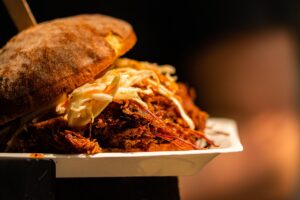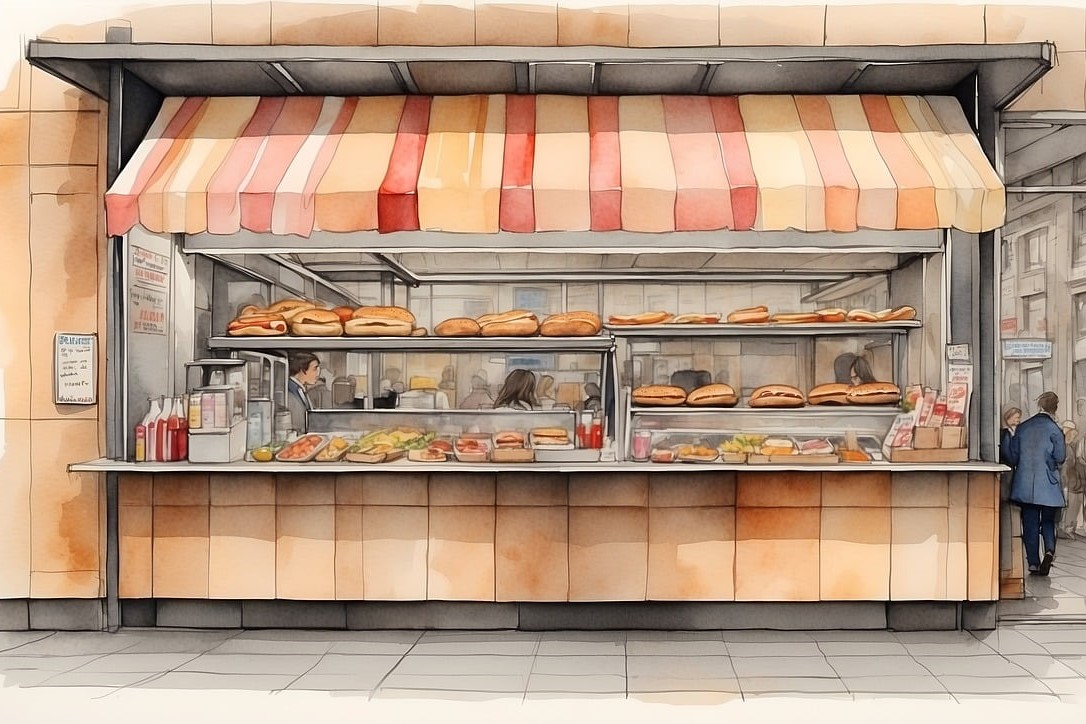QSR Street Food: A Revolution in the UK Dining Industry
The advent of QSR street food. Imagine strolling through a bustling London street, surrounded by the aroma of sizzling spices and fresh ingredients, with food trucks offering everything from traditional fish and chips to spicy Indian curries. This scene represents the heart of Quick Service Restaurant (QSR) street food—a phenomenon transforming how we eat in the UK. QSR street food isn’t just about convenience; it’s about offering a variety of affordable, flavourful, and culturally rich meals that fit seamlessly into our busy, modern lives.
In recent years, the UK has seen an explosion in the popularity of QSR street food, reflecting broader trends in the global dining industry. According to Statista, the UK fast food market is projected to reach £20.12 billion in 2024, and street food has significantly contributed to this expansion. The rise of QSR street food highlights a shift in consumer preferences toward quick, diverse, and convenient dining options that don’t compromise quality.

The Unique Appeal of QSR Street Food in the UK
What makes QSR street food so appealing to British consumers? The achievement can be linked to various important elements that appeal to contemporary consumers throughout the UK.
- Affordability: In the current economic climate, where the cost of living continues to rise, budget-conscious diners turn to street food for affordable meals without sacrificing taste. In cities like London, Bristol, and Manchester, you can enjoy high-quality meals for a fraction of the price of traditional restaurants.
- Speed: The fast-paced nature of city life means people are constantly on the go. QSR street food is designed to be quick, making it perfect for grabbing lunch between meetings or a snack during a busy day. Whether it’s a falafel wrap or a freshly made pizza slice, the focus is on delivering tasty meals quickly.
- Diversity: The United Kingdom is recognised for its varied cultural landscape, beautifully reflected in the street food scene. Whether you’re craving Mexican burritos, Jamaican jerk chicken, or Vietnamese banh mi, QSR street food in the UK offers an incredible array of global flavours. This variety makes street food a favourite among adventurous foodies looking to explore new tastes.
- Customisation: Many QSR street food vendors in the UK offer customisable menus, allowing customers to tailor their meals according to their preferences. Whether selecting the level of spice in your curry or choosing gluten-free options, this personal touch enhances the dining experience.
These factors combine to make QSR street food an exciting and accessible option for British consumers, blending convenience with authentic world flavours.

How QSR Street Food Reflects Changing Consumer Preferences in the UK
In recent years, UK consumer preferences have shifted significantly. People are no longer just seeking fast food—they are looking for quality, sustainability, and a variety of choices that address their changing preferences.
Health-Conscious Dining:
With the rise of healthy eating movements in the UK, QSR street food vendors increasingly offer nutritious alternatives. Consumers are seeking meals that are lower in fat, sugar, and calories yet still packed with flavour. Popular options now include vegan burgers, fresh salad bowls, and grilled lean meats, reflecting the growing demand for health-conscious street food.
Sustainability:
British consumers are more environmentally aware than ever, and this is reflected in their food choices. According to research by WRAP, 81% of people in the UK feel that businesses should focus on reducing food-related waste. In response, many QSR street food operators are adopting eco-friendly practices, using biodegradable packaging and sourcing ingredients locally to reduce their carbon footprint.
Ethnic and Fusion Cuisines:
The UK’s love for international cuisines has fuelled the growth of street food markets offering a wide range of flavours. Whether it’s Lebanese wraps, Korean street food BBQ, or Caribbean jerk dishes, the appetite for bold, exotic flavours continues to grow. Fusion dishes, such as sushi burritos from Japanese street food or indian street food such as Indian-style tacos, have also gained popularity, showcasing the UK’s evolving palate.
Digital Ordering and Delivery:
The rise of digital platforms has made it easier than ever for British consumers to access their favourite street food. Search street food near me on Apps like Deliveroo, Uber Eats, and Just Eat and you will be spoilt for choice. These Apps have transformed how people dine, enabling them to enjoy street food while relaxing at home. In fact, a study by the Statista found that the foodservice delivery market in the United Kingdom was valued at approximately 13.4 billion British pounds in 2022, highlighting the impact of technology on QSR street food.
As these trends persist, they significantly influence consumer preferences and behaviours. The UK’s QSR street food industry is well-positioned to grow by offering innovative, convenient, and high-quality dining options.
Key Drivers of Growth in the UK QSR Street Food Segment
Several factors have contributed to the rapid growth of the QSR street food industry in the UK, making it one of the most dynamic sectors in the dining landscape.
Urbanisation and Busy Lifestyles: As more people move to urban centres, especially in cities like London, Birmingham, and Manchester, the demand for quick, convenient food options has soared. QSR street food, with its emphasis on speed and portability, fits perfectly into the lives of urban dwellers. Whether it’s a quick bite during lunch breaks or an evening snack on the way home, street food vendors cater to the fast-paced lifestyles of city residents.
Innovation in Menus: British street food vendors are constantly innovating to keep their menus fresh and exciting. From jackfruit vegan tacos to loaded fries with international toppings, the level of creativity in the UK street food scene is impressive. This innovation has successfully engaged a diverse audience, appealing to traditional fast-food enthusiasts and gourmet food lovers.
Technology Integration
Incorporating technology has been essential in broadening the accessibility of QSR street food in the UK. Food delivery apps, mobile payments, and online pre-ordering have made street food more accessible to consumers. For example, London’s KERB street food markets have embraced these technologies, offering contactless payments and online ordering to streamline the customer experience.
Food Truck Revolution: The food truck revolution in the UK has brought street food to new heights. These mobile kitchens allow QSR operators to move around different cities and events, from festivals to pop-up markets. With operating expenses that are comparatively lower than those of conventional restaurants, food trucks offer an affordable way for entrepreneurs to enter the food industry while bringing street food to a wider audience. According to research by NCASS, the UK street food industry is worth an estimated £1.2 billion, with food trucks playing a central role in this growth.

Challenges Facing QSR Street Food Operators in the UK
While the QSR street food industry in the UK is booming, operators face several challenges that can affect their long-term success.
- Regulatory Compliance: Street food vendors must navigate a complex set of local regulations, particularly around food safety and hygiene. In the UK, food vendors are subject to regular inspections by local councils to ensure they meet high standards of cleanliness and food preparation. These regulations, while essential, can pose challenges for small operators looking to expand or scale their businesses.
- Supply Chain Disruptions: Like many industries, QSR street food vendors in the UK have faced disruptions in their supply chains. The consequences of Brexit and the COVID-19 pandemic have created challenges for certain vendors in sourcing essential ingredients. These disruptions have affected supply chains and availability, complicating many businesses’ procurement processes, particularly those offering globally inspired menus. Such disruptions may result in shortages or higher expenses, which can impact the reliability of menu selections.
- Competition: The UK street food scene is highly competitive, with new vendors regularly entering the market. In cities like London, food markets such as Borough Market and Boxpark are bustling with street food vendors, all competing for the same pool of customers. To stand out, operators need to offer something unique, whether it’s an innovative menu, exceptional customer service, or a focus on sustainability.
Sustainability and Ethical Considerations in UK QSR
As the UK becomes more environmentally conscious, QSR street food operators are being called upon to implement sustainable and ethical practices. This shift is not just a trend—it’s a necessity for long-term success in the industry.
Eco-Friendly Packaging:
With growing concern over plastic pollution, UK consumers are increasingly demanding sustainable packaging solutions. Many QSR street food vendors are switching to biodegradable or recyclable materials to reduce waste. For example, food trucks at the famous Camden Market now use compostable containers. They are incorporating the use of biodegradable cutlery into their practices as a way to demonstrate their commitment to reducing plastic waste. This initiative helps minimise environmental impact and promotes sustainable alternatives in everyday dining experiences.
Sourcing Locally:
British consumers want to support local businesses and reduce their carbon footprint. By sourcing ingredients locally, QSR street food operators can offer fresher produce while supporting UK farmers. This approach benefits the environment and appeals to consumers looking for more ethically sourced food.
Fair Labour Practices:
Ethical labour practices are a growing concern for UK consumers, who are increasingly aware of how their food is produced. Street food vendors who emphasise fair wages, ensure safe working conditions, and maintain transparency in their supply chains tend to foster greater customer trust and loyalty. This approach supports ethical practices and enhances the overall customer experience.

The Future of QSR in the UK: What to Expect
The future of QSR street food in the UK looks bright, with several trends and innovations expected to shape the industry in the coming years.
Increased Focus on Health:
As the demand for healthier dining options grows, expect to see more QSR street food vendors offering plant-based, low-calorie, and allergen-free meals. With movements such as Veganuary gaining traction in the UK, the shift towards vegan and vegetarian options is set to continue.
Automation and Robotics:
Some UK QSR street food operators are already experimenting with automation to streamline their processes. Automated cooking systems and contactless robotic servers could soon become more common, improving efficiency and reducing costs.
Personalised Dining Experiences:
With the rise of AI and data analytics, QSR street food operators in the UK can offer more personalised experiences. By analysing customer preferences and past orders, vendors can tailor their menus and promotions to individual tastes, creating a more engaging and personalised service.
Global Expansion:
As QSR street food continues to grow in popularity, UK vendors can expand into international markets. British street food operators that showcase unique cultural dishes or fusion cuisines may find success in exporting their offerings to other countries.
Related articles:
Conclusion
QSR street food has firmly established itself as a critical player in the UK’s dynamic dining scene. With its blend of convenience, affordability, and culinary creativity, it has transformed the way we eat and has become a staple for busy urbanites and food lovers alike. As the industry continues to evolve, driven by changing consumer preferences and technological advancements, QSR street food in the UK is set to thrive, offering innovative and sustainable dining solutions for years to come.
FAQ’s
What does QSR mean in food?
QSR stands for Quick Service Restaurant, a term used to describe establishments that serve fast, affordable meals with a focus on convenience. These restaurants typically offer limited table service and are designed for efficiency, catering to busy customers on the go. Customers place their orders at a counter and receive their food promptly.
What is the difference between QSR and fast food restaurants?
While both QSRs and fast food restaurants focus on quick service, QSRs may offer a broader range of menu options and higher-quality ingredients. Fast food chains are often associated with burgers and fries, whereas QSRs might serve healthier, more diverse options, including salads, wraps, and ethnic dishes. Fast food emphasises speed over variety.
What brands are under QSR?
Popular QSRs include McDonald’s, Subway, KFC, and Burger King. These brands are known for their fast service, affordability, and global presence. Chains like Taco Bell, Domino’s, and Starbucks are also considered QSRs due to their focus on quick, convenient meals and drinks.
What is a QSR brand?
A QSR brand is a company that operates under the Quick Service Restaurant model, providing fast, affordable food to customers with minimal table service. These brands are known for efficiency, standardised menus, and fast preparation times. Common examples include McDonald’s, Subway, and Pret A Manger, which cater to busy consumers seeking quick meals.
Are there any British fast-food chains?
Yes, the UK has several popular fast-food chains. Greggs, known for its baked goods and sandwiches, is one of the largest. Pret A Manger, another well-known British brand, focuses on fresh, ready-to-eat meals. Other examples include Leon and Fish & Chip shops like Harry Ramsden’s.


